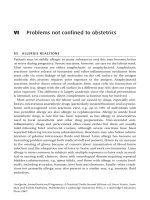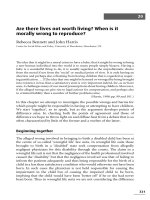hamley was not looney toones
Bạn đang xem bản rút gọn của tài liệu. Xem và tải ngay bản đầy đủ của tài liệu tại đây (30.14 KB, 2 trang )
Hamlet was indeed a very sane man. He was only feigning
madness to further his own plans for revenge. His words were so cleverly
constructed that others will perceive him as mad. It is this consistent
cleverness that is the ultimate evidence of his complete sanity. Can a
mad person be so clever? No, a mad person cannot. Hamlet is sane and
brilliant. After Hamlet, Horatio, and Marcellus see the ghost, Hamlet
tells Horatio that he is going to "feign madness". If Horatio is to notice
Hamlet acting strange it is because he is putting on an act. "How strange
or odd some'er I bear myself/(As I perchance hereafter shall think
meet/To put an antic disposition on)/That you, at such times seeing,
never shall,/With arms encumbered thus, or this headshake ,/Or by
pronouncing of some doutful phrase,/As "Well,well,we know," or "We
could an if we/would,"/Or "If we list to speak," or "There be an if
they/might,"/Or such ambiguous giving-out, to note/That you know of
me-this do swear,/(I,v,190-201).Hamlet states that from this point forward
I may act weird but to ignore my acts of madness for they are just that,
acts, and are in no way a sign of true madness. Only a sane and rational
person could devise such a plan as to act insane to convince others that
he is insane when he actually has complete control over his psyche.
Hamlet only acts mad when he is in the presence of certain
characters. When he is around Polonius, Claudius, Gertrude, Ophelia,
Rosencrantz, and Guildenstern he acts completely irrational. When
Hamlet is around Horatio, Bernardo, Fransico, the players, and the
gravediggers Hamlet acts completely sane. When Hamlet and
Polonius meet in II,ii Hamlet calls Polonius a fishmonger and makes
strange conversation with him. In IV,iii Hamlet refuses to tell Claudius
were he has hidden the body of Polonius and goes on about how
Polonius is at supper. When Hamlet encounters Gertrude in her closet,
an unusual place, in III,iv. He yells at his own mother. In II,i Hamlet enters
Ophelia's closet, a highly unusual act, he is dressed badly, and acts very
strange towards her. Claudius and Polonius set up a clandestine meeting
between Hamlet and Ophelia in III,i. Ophelia then tries to return some
gifts that Hamlet gave to her and Hamlet claims that he did not give her
any gifts and that he never loved her at all. During the play in III,ii Hamlet
sexually harasses Ophelia in front of the entire audience of the play. In
IV,ii Hamlet refuses to tell Rosencratz and Guildenstern where he has
hidden the body of Polonius. Hamlet has Rosencratz and Guildenstern,
two people that used to be his friends, put to death in England. On all
occasions when Hamlet is in contact with Horatio, Bernardo, Fransico, the
players and the grave diggers Hamlet acts like a completely normal
person under complete control of his psyche. Only a person that was truly
sane and had a definite purpose behind a feigned madness could pull off
such believable acts of feigned madness. Even Claudius and
Polonius believe that Hamlet is not insane. "Love? His affections do not
that way tend/Nor what he spake, though it lacked form a little,/Was not
like madness. There's something in his soul/O'er which his melancholy
sits on brood/And I do doubt the hatch and the disclose" (III,i,176-180).
Claudius states Hamlet's emotions are not from love. What he does is not
like madness, but it has a higher purpose. Hamlet knows something is
amuck and that he is going to set things right. His madness is part of a
plan that he has which is about to be hatched."Though this be madness,
yet there is/method in't" (II,ii,223-224). This occurs when Polonius and
Hamlet are talking and Hamlet is acting unusual and Polonius clearly
states that he believes that there appears to be a reason behind Hamlet's
actions and that they are logical in nature. Shakespear gives a
definite example of someone who has definitely gone mad in the play
Hamlet. Ophelia is definitely crazy. After being rejected by Hamlet and
the Death of her father she just could not handle it anymore. She went
around dancing, singing about death, erratic behavior, and ultimately her
"death". She just could not handle everything that had happened to her
and gave up. On the other hand Hamlet is not crazy, he has complete
control over his psyche. Hamlet tells his mother that he is not mad.
"That I essentially am not in madness/ But mad in craft" (III,iv,209-210).
Hamlet states, that he is not crazy in a sense that he has lost it
completely and gone totally insane, but crazy like a fox. He has a plan to
avenge his father's murder. Hamlet is not mad. Everything he does
has a purpose to it. He is out to avenge his father's murder. The facts that
support this argument are Hamlet tells Horatio that he is going to feign
madness, Hamlet only acts mad in front of certain characters. Claudius
and Polonius believe that Hamlet is not mad but that there is a purpose
behind his madness, Shakespear gives an example of a truly mad
person, and that Hamlet tells his mother that he is not crazy. These facts
prove beyond a doubt that Hamlet had complete control of psyche at all
times throughout the play.









